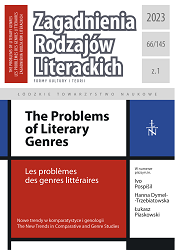Rozmawiaj ze zwierzętami. Animal Crossing: New Horizons
Talk to Animals. “Animal Crossing: New Horizons”
Author(s): Rafał SzczerbakiewiczSubject(s): Media studies, Social Informatics, ICT Information and Communications Technologies, Identity of Collectives
Published by: Łódzkie Towarzystwo Naukowe
Keywords: video games; second-person narration; avatar; free will subject; defamiliarization; Animal Crossing: New Horizons;
Summary/Abstract: Video games which base their narration on avatar-based representation of the player shift the narrative towards the interactive receiver, a “surrogate self ” within the game’s tale. The immersive activism of the sovereign influence of the player on the course of the game is nonetheless significantly limited in case of procedural games, as the interactivity may prove to be an imposed or anticipated inter-passivity of the receiver. The chaos-inducing and destabilizing effect of the pandemic on social life shown in the example of the rhetorical, both utopian and persuasive game Animal Crossing proved to be the anticipated virtual ersatz of real social order. The players’ anxious dissociations and dislocations were assuaged by the rhetorical disposition of the game, which does not require deep investment. It is an ambient game in the sense that the player allows his in-game islander avatar to “lead them by hand”. The player does actively belong to the allotopic community, but nevertheless their alternative post-identity becomes a form of psychological escapism which allows them to relinquish factual decision making. Meanwhile, to explore the new possibilities of the island community, the game poses a condition: one has to accept its dominant economic aspect. Animal Crossing’s narrative subordinates the active interaction in-game to obedience to rhetorical procedures which, through second-person narration, impose quasi-capitalistic rules of order to the simulation of island fun. The player is thus not sovereign in their actions, but rather they follow instructions aimed at them. The market regulations of late capitalism form the ideological background of these instructions. The eutopic narrative thus conceals the paradox of the neoliberal “object of free will” which is only possible at the cost of repression and real constraints on autonomy and choice, even in the alternate form of in-game post-identity.
Journal: Zagadnienia Rodzajów Literackich
- Issue Year: 66/2023
- Issue No: 1
- Page Range: 261-277
- Page Count: 17
- Language: Polish

